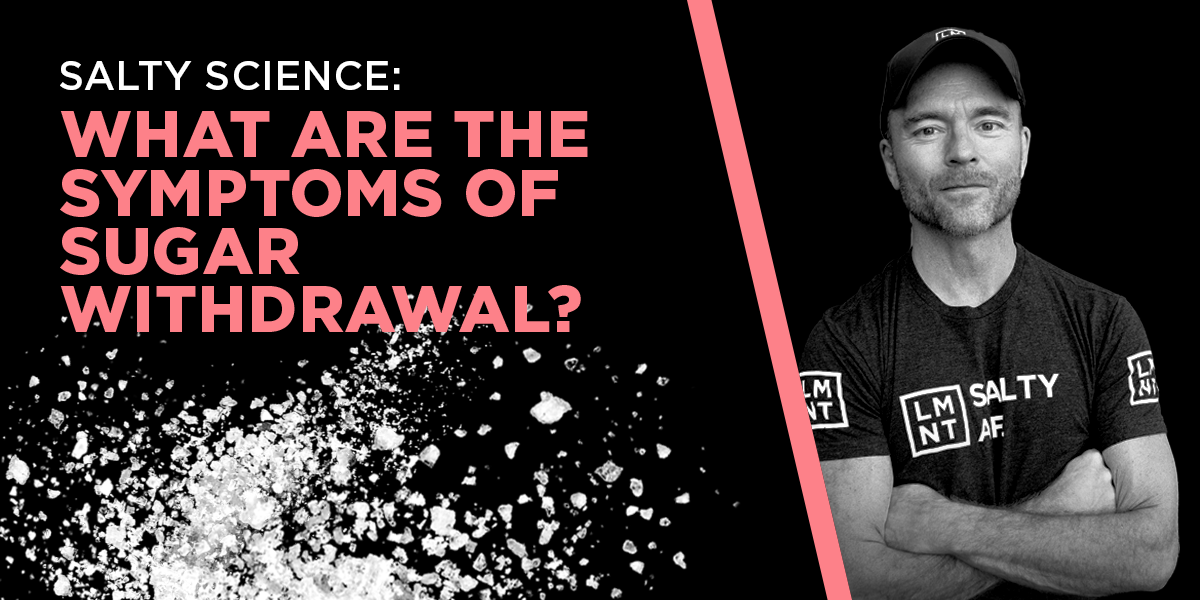Sugar is big business in the United States. The average US American consumes over 77 pounds of sugar and sugar derivatives each year, and the government isn’t helping. The sugar industry receives about $4 billion in annual subsidies in the form of price support, tariffs, and crop loans—all to help us produce 9 million tons of sugar per year. Not exactly promoting general welfare, are they?
My point is, we’ll have to take matters into our own hands. If we cut added sugars out of our diet one-by-one, I believe we can dramatically reduce the rates of many modern diseases.
The bad news? Suddenly and dramatically reducing your sugar intake can make you feel terrible. Ideally we’d be positively reinforced for making a healthy choice, but that’s not always what physiology dictates in the short-term. No, our habitual bodies prefer consistency, particularly with dopamine-rewarding molecules like sugar. So for the average soda fan, this change may not come easily. The good news? I can promise you that it’s worth it.
In this article, I’ll cover sugar withdrawal symptoms, what causes them, and recommend safe alternatives to sugar. Consider it a resource to help you (and others) understand and combat the pull of sugary foods.
What Causes Sugar Cravings?
Back in pre-industrial times, sugar was a luxury product. Today, it’s available in mass quantities. You’ll find added sugar in soups, sauces, cookies, crackers, salad dressings, and almost anything else that comes in a package. But the biggest source of refined sugar in our diet are beverages: fruit juices, sodas, and so-called “sports” drinks.
Consume enough of these products, and eventually, a neurochemical dependence on high-glycemic foods and drinks may develop. So yes, one can become “addicted” to sugar in a way—but I use that term softly. This is a bit of a contentious topic, but for the purpose of this article I’d prefer we not split hairs. Folks can (and do) eat themselves to death, and they are not doing that with chicken and broccoli.
For a deeper look at what drives sugar cravings, check out 5 ways to reduce sugar cravings (and why we crave it).
The Symptoms of Sugar Withdrawal
If you go from a high-sugar diet to a low sugar diet, you may experience sugar withdrawal symptoms that include:
- Intense cravings for sugar
- Headaches
- Feeling low energy or fatigued
- Muscle aches
- Nausea, bloating, or other GI symptoms
- Irritability
- Feeling anxious, down, or depressed
Be aware, however, that the withdrawal symptoms aren’t always related to sugar directly.
What Else Causes Sugar Withdrawal Symptoms?
If you limit your carb intake dramatically, you may experience a constellation of symptoms known as keto flu. Beyond sugar withdrawal, here are four other potential causes of these symptoms:
#1: The brain switching fuel
When you eat a very low-carb diet (like keto) the liver begins to burn fat for energy and produce ketones as backup brain fuel. The brain normally runs entirely on glucose, but in ketosis, it runs partly on ketones too. This alternative fuel system helped our ancestors survive when foods was scarce.
However this switch doesn’t flip instantaneously. There’s a transition period—normally between 1-3 days—which often entails headaches and brain fog. Barring other potential causes, keto flu symptoms should be short-lived. To ease this transition, consider taking MCT oil (a highly ketogenic fat) to boost ketone levels while your brain keto-adapts.
That said, you’ll need to be sure to dial in your sodium on a low-carb diet or these issues will persist.
#2: Low sodium
If you transition to a low-carb diet and you’re still feeling bad a few days later, you’re likely experiencing the effects of sodium deficiency. People often mistake the symptoms of low sodium—cravings, headaches, and fatigue—as sugar withdrawal symptoms. They present similarly, and I see it all the time: when people fix the deficiency, the symptoms vanish.
It makes sense when you understand the mechanics of low-carb dieting. A keto diet not only increases urinary sodium loss, but it also restricts salty processed foods when you’re eating healthy. More salt is going out, less is coming in. To find out if low sodium is causing the issue, simply try bumping up your sodium intake. LMNT has enough sodium to make a noticeable difference in how you feel, and zero sugar.
#3: Gut microbiome shifts
First of all, quitting a high-sugar diet is a winning move for your gut. Reducing sugar intake can help treat bacterial or fungal overgrowths in the small intestine, plus lower sugar intakes appear to encourage the growth of anti-inflammatory bacteria. But whenever you change your diet, your gut bacteria change too. These changes often bring digestive symptoms along with them.
Assuming you don’t have chronic gut issues, try upping your fiber intake to keep things regular. This will also keep your gut bacteria happy since fiber is their favorite food.
#4: Dehydration
Low-carb diets have a diuretic effect. If the fluids lost through urine aren’t replaced, it can cause dehydration symptoms that mimic sugar withdrawal symptoms. Still, healthy people rarely become dehydrated. The thirst mechanism sees to that. The bigger problem is sodium deficiency.
Recommended Sugar Alternatives
If you want to change a bad habit, it’s useful to replace the undesirable behavior with a less harmful alternative. You might, for instance, squeeze a stress ball or take deep breaths instead of biting your nails to relieve tension. The same logic applies to a bad sugar habit. If you want to break it, replace it.
Replace it with what? I recommend stevia, a zero-calorie sweetener derived from the leaves of the stevia rebaudiana plant. It’s got a nice taste, plus it has cool antioxidant and anti-diabetic properties. I also like a couple other healthy sugar alternatives, like monk fruit and allulose. All are non-caloric, non-glycemic, and non-insulinogenic.
Along with stevia, these natural sweeteners make quitting sugar easier. Just remember that your palate preference shifts according to the flavors you consume frequently, so it’s best not to make a habit out of eating anything sweet.

